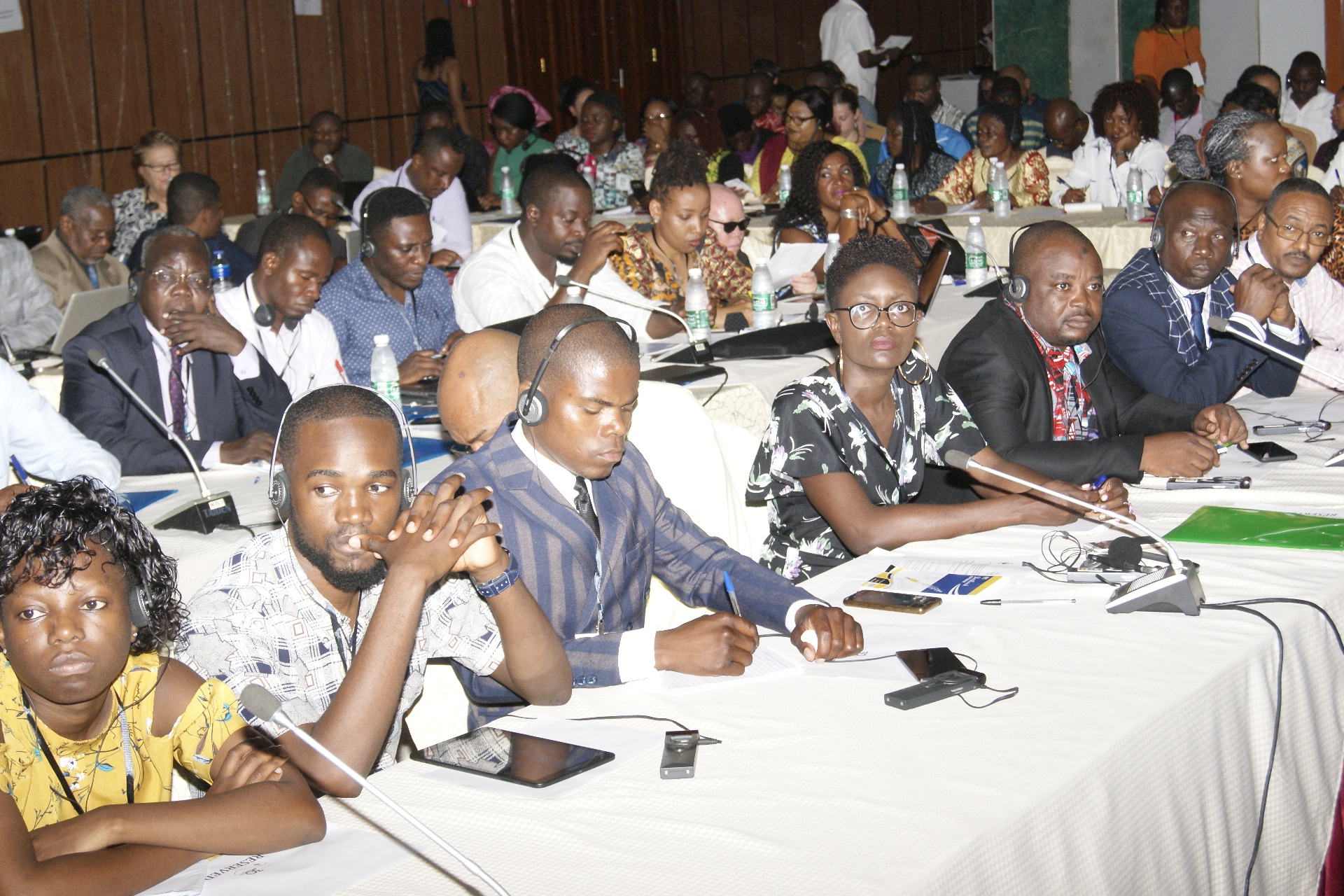The situation of human rights in Africa
As per usual, focal points from every sub-region gave an overview of the human rights situation in their respetive regions. In West Africa, defenders continue to evolve in an increasingly limited space. Indeed, in Benin the government adopted in 2018 a new Criminal Code providing in its article 240 that any direct provocation to an unarmed assembly, that is to say to a peaceful assembly, is punished by imprisonment for one year if it has been followed up by action. In Togo, although the initiative to adopt a national protection law was welcomed, there are still concerns about an oppressive law adopted on 7 August 2019 which restricts the freedom of peaceful assembly. This law prohibits demonstrations at certain times, in certain places and allows the government to limit the number of demonstrations per week. In Central Africa, the situation of Cameroon and the countless human rights violations committed against the anglophone population remains worrying. In East Africa, the situation in Tanzania is still of concern especially in view of the 2020 presidential elections. Since 2015, Tanzania has adopted a number of laws such as the Cybercrimes Act and the Media services act, which give authorities extensive powers restricting the legitimate exercise of fundamental freedoms by citizens and allowing them to arbitrarily charge human rights defenders, journalists, bloggers and all other dissenting voices.
Refugees, returnees and internally displaced persons: towards durable solutions to forced displacement in Africa
During these three days, civil society organisations engaged in fruitful discussions mainly focused on this year’s theme adopted by the African Union. Among other things, they analysed the situation of specific groups facing these issues. A panel discussion emphasised the importance of women’s participation and leadership in ensuring human security. ‘We need to challenge norms that affect gender equality and women rights instead of only focusing on awareness education’ said Annette Mukiga from Femwise Africa, the Network of African Women in Conflict Prevention and Mediation established by the African Union.
The Pan African Lawyers Union also shared progress and status updates on the relevance of the draft action and implementation plan for the Human and Peoples’ Rights decade in Africa (10-YAP) to the 2019 African Union’s theme, and more specifically to the Protocol on statelessness/nationality in Africa. Lawyers for Human Rights presented the major advances of the Draft Protocol, urging participants to join continental initiatives such as Citizen Rights in Africa Initiative and other regional networks such as the Southern African Nationality Network, among others, to advance collective action. In addition, Tshego Mothapo, from Lawyers for Human Rights, stressed the role and importance of the Protocol in ensuring more inclusive societies, the elimination of gender discrimination in nationality laws and in closing administrative and legal gaps as well as discriminatory practices preventing people to access nationality.
Other panels were discussed such as on xenophobia in South Africa, the protection and provision of basic needs to internally displaced persons and migrants or the threats to freedom of expression in digital age in Africa and the impact of surveillance on the right to privacy.
Participants were invited to contribute to all discussions and provide additional information on the situation in their respective countries.
Interests groups
On the second day, defenders gathered in specific thematic groups to engage in in depth discussions about these issues. It included the rights of women in Africa, freedom of association and assembly in Africa, indigenous populations in Africa, extractive industries, the environment and human rights, sexual orientation and gender identity as well as reprisals against defenders engaging with the African Commission. For this last group, defenders highlighted their concerns about intimidation and reprisals committed by recent host countries of the Commission’s ordinary sessions against defenders seeking to engage, or engaging with the Commission, including Mauritania and Egypt.
In their recommendations they included for the African Union Commission (AUC) to call on States to adopt national laws guaranteeing the right to access and communicate with regional bodies as well as implement a resolution asking them to refrain from intimidating defenders for engaging with the ACHPR. They also called on the African Commission on Human and Peoples’ Rights to allocate more resources to the focal point on reprisals to ensure he can implement his mandate including document and address cases directly with States and follow up on them.
Resolutions and recommendations adopted
During its last session of the third day, participants adopted several resolutions and recommendations to be submitted to the Commissioners of the African Commission for their review and potential adoption.
Country Resolutions:
- CRES/001/010/19: Benin
- CRES/002/010/19: Cameroon
- CRES/003/010/19: Egypt
- CRES/004/010/19: Guinea Conakry
- CRES/005/010/19: DRC
- CRES/006/010/19: Tanzania
- CRES/007/010/19: Togo
- CRES/008/010/19: Zimbabwe
Thematic Resolutions
- TRES/001/010/19: Nationality
- TRES/002/010/19: Privacy
- TRES/003/010/19: Durable solutions
Thematic Recommendation
- TREC/001/010/19: Corruption
- TREC/002/010/19: Intersex
- TREC/003/010/19: Shadow Reporting
- TREC/004/010/19: Solutions to address refugees and forced displacement
These three days bringing together defenders from all over Africa reflected the engagement, solidarity and dedication of civil society on the continent.
Contact: Adélaïde Etong Kame, African Advocacy Consultant, [email protected]
Photo: John Gbenagnon/ACDHRS




